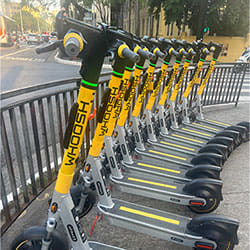With the country's final exit from the European Union, which took place on the 31st of December 2020, the free movement of goods and people between the two has ended and in order to continue to reside in Her Majesty's kingdom, Europeans who had moved here in the past will have to apply by June 2021 (therefore a sort of ‘grace period’ was offered) to the European Union Settlement Scheme which, by proving that they resided in the country before the 31st of December 2020, gives the right to permanent residency (settled status) for those who have lived in the UK for more than five years, or temporary residency for five years (pre-settled status) for those who have lived there for less than that amount of years.
The transition to this new system has brought some changes to the life of Europeans in the country because many of us who work here have been asked for proof that we have the right to stay.
Having moved here when there was freedom of movement, it is now strange that we have to prove this right with letters and documents and since I have an accent when I speak, I sometimes feel discriminated against even though I realize that sometimes it might just be the fact that I am sensitive or that people are now wary of others in general because of Covid-19.
It is not a great impediment, but it is certainly an annoying thing when I’m asked to prove I’m a legal immigrant because this was not the assumption with which I arrived here to work and I’m only doing my job!
Immigration has been one of the key issues in the Brexit debate and Europeans who from the 1st of January 2021 want to move to study or work in the United Kingdom will have to clash with the new immigration points system that favours skilled immigrants and the talent of people compared to where they come from.
With the new system, it will no longer be possible to enter the country as tourists and then look for a job.
From now on you can only move to the United Kingdom for work if you previously applied for a visa, for example for ‘a skilled worker visa’. This kind of visa is obtained by satisfying a series of requirements, including: knowledge at a B1 level of the English language and being offered a job with a minimum wage threshold usually at about £25,000 per year.
If the job offers less money, it is still possible to get the visa “by adding points”, for example, with a PhD in a subject useful to the job that you will go to perform or with a job offer in a sector with a shortage of staff in the UK.
In order to be eligible for a visa a total of 70 points must be accumulated for what I understood by reading the government website explaining the new rules on Brexit.
From now on, the possibility for Europeans to move to the country without already being in possession of a job offer is therefore excluded.
All this has been done to avoid, from the government's point of view, the immigration of unskilled workers from the European Union.
European workers, however, are not the only ones affected by the immigration points system.
Even students, who previously could study at prestigious British universities under the same conditions and paying the same fees as their British and Northern Irish counterparts (lower than those for non-Europeans), will now have to apply for a special visa and pay for a health insurance before going.

London and the UK are now a further dream for some






























































